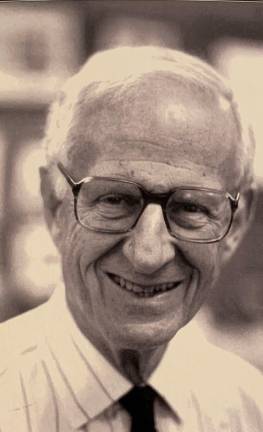Robert Morgenthau’s life of public service
Family, friends and colleagues, including a Supreme Court Justice, gathered last week to honor the New York legal legend


Nearly a thousand people celebrated the life of Robert Morgenthau, New York’s longest serving district attorney, last Thursday at Temple Emanu-El on Fifth Avenue and 65th Street. The service drew Supreme Court Justice Sonia Sotomayor, New York politicians Mayor Bill de Blasio and former Governor Eliot Spitzer, and the city’s legal elite.
Sotomayor, Pierre Laval, senior judge of the United States Court of Appeals for the Second Circuit, and former Assistant U.S. Attorney for the Southern District of New York Steve Kaufman, spoke at the ceremony, eulogizing Morgenthau’s professional accomplishments and commitment to pursuing justice. Six of his children — Amy, Anne, Barbara, Bob, Jenny, and Josh — also spoke, and painted a picture of “the Boss,” as he was called in professional circles, as a loving father and grandfather.
A Family Tradition of Service
Public service was in Robert Morgenthau’s blood. Temple Emanu-El Senior Rabbi Emeritus Ronald B. Sobel, who officiated the service, began by paying homage to the “Morgenthau trilogy” who devoted their lives to public service: Robert’s grandfather, Henry Sr., who served as Woodrow Wilson’s ambassador to the Ottoman Empire during World War I; Robert’s father, Henry Jr., who was FDR’s treasury secretary; and Robert, who enlisted in the Navy during World War II, served as federal prosecutor for the Southern District during the Kennedy and Johnson administrations, and spent 34 years as District Attorney for New York County.
Sotomayor, who worked under Morgenthau at the New York County office and regarded him as a mentor, detailed Morgenthau’s innovative practices as district attorney. In particular, she highlighted his creation of specialized prosecutorial divisions in sex crimes and narcotics. Further, Sotomayor recognized the values that governed Morgenthau’s approach to prosecution. “In the Boss’s office, it was never the verdict at the end of the case that mattered, but whether we had carefully and fully investigated all of the facts, put forth the most powerful argument, and fairly presented the evidence to the jury for its determination. Although vigorous prosecution was important, so was fairness,” she said.
Morgenthau’s reverence for fairness, Sotomayor said, has guided her in her professional and personal life. “It is around this very notion of justice that I strive to structure my life on the bench ... Without Morgenthau I would be neither the person or the justice I am today,” she said.
Unparalleled Integrity
For a man as successful and privileged as he was, Morgenthau was humble and moral, speakers said. “We received the privilege of working for a man who exemplified a spirit of public service and integrity that was unparalleled,” said Sotomayor. Kaufman noted Morgenthau’s “belief in integrity; his anathema to seeking ego; his belief not in adulation but in achievement.”
When speakers were not praising Morgenthau’s accomplishments, they joked about his two unsuccessful bids for governor of New York. “The papers called the boss a stiff and awkward public speaker. They were right,” Sotomayor said.
His children’s remarks offered a window into Morgenthau’s personal life: he was a quiet man with a boyish sense of humor who never raised his voice. He loved boating, spending time at the family farm in East Fishkill, New York, and eating lobster. He was married to journalist Lucinda Franks for 42 years. His first wife died in 1972.
Speakers also highlighted Morgenthau’s contributions to New York City non-profits. He chaired the Police Athletic League, helped to create the Museum of Jewish Heritage, and was a founding director of the Immigration Justice Corps.
Morgenthau died July 21 at Lenox Hill Hospital, ten days short of his 100th birthday.